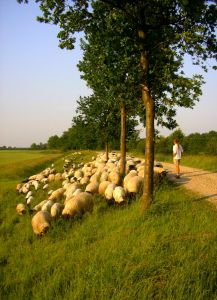Today in 1715 – Nahum Tate Died
Most often our hymn writers were spiritual men and women, whose songs grew out of their own experience with God. Usually, but not always. Nahum Tate was the son of an Irish clergyman named Faithful Tate, but in Nahum’s own life he proved anything but faithful. A heavy drinker, who wasted his substance to the point where he ended his days in a debtors’ refuge, he did not seem to fit the part of a hymn writer!
But Nahum Tate was a gifted author. He wrote largely for the London stage, sometimes producing his own works, sometimes revising the works of others, including Shakespeare. He was appointed poet laureate of England in 1690. His place in hymnody came about through a partnership with Nicolas Brady. The two men produced a fresh metrical version of the Psalms that became the standard in the Church of England for 200 years. Here is how their rendering of Ps. 42 begins:
As pants the hart for cooling streams,
When heated in the chase,
So longs my soul, O God, for Thee
And Thy refreshing grace.
Tate and Brady also added a supplement to their New Version of the Psalms of David, presenting 16 hymns of their own. This audacity was not appreciated by all, as many felt the church should sing only the Psalms. However, Tate’s rendering of the Christmas story from Luke Chapter 2 is close to being an exact quotation from the Scriptures, so this helped it gain acceptance. It is the only one of the hymns from the supplement still in use today. He wrote:
While shepherds watched their flocks by night,
All seated on the ground,
The angel of the Lord came down,
And glory shone around.
“Fear not!” said he, for mighty dread
Had seized their troubled mind.
“Glad tidings of great joy I bring
To you and all mankind.”
(2) Today in 1827 – William Blake Died
English painter and poet William Blake created some most unsual lines of verse as part of a longer work. It cannot precisely be called a hymn, but it is inspirational–certainly for the people of Britain.
There is a legend (not supported by the Scriptures) that Jesus, in His youth, and accompanied by His “uncle,” Joseph of Arimathea, visited the British Isles. Neither the mythical visit nor the familial relationship to Joseph of Arimathea is biblical. And Blake is rather coy about defending it. (Notice how he deals with it in the first stanza using questions, rather than statements!)
Granted that Blake had some subversive ideas often not understood by those who sing his words, if we may summarize the point of the song, it is this. What if Jesus did come? When He came, did England receive a touch of heaven, and become like the New Jerusalem, the heavenly city (Rev. 21–22)? Whether or not that’s the case, says Blake, we need to take up the fight, here and now, to make our country all that it should be.
The song became great expression of social protest in Britain, for those opposed to the “dark satanic mills” of the industrial revolution, and the oppression of workers. In 1916, at a meeting in the Albert Hall of the supporters of Women’s Suffrage, the song was sung for the first time to Sir Hubert Parry’s superb tune.
Jerusalem was also used in the Academy Award-winning film Chariots of Fire (with the movie actually taking its title from the second stanza).
And did those feet in ancient time
Walk upon England’s mountains green?
And was the Holy Lamb of God
On England’s pleasant pastures seen?
And did the countenance divine
Shine forth upon our clouded hills?
And was Jerusalem builded here
Among those dark satanic mills?
Bring me my bow of burning gold!
Bring me my arrows of desire!
Bring me my spear! O clouds, unfold!
Bring me my chariot of fire!
I will not cease from mental fight,
Nor shall my sword sleep in my hand,
Till we have built Jerusalem
In England’s green and pleasant land.
View the song, Jerusalem, sung and enjoyed by an enthusiastic audience.
(3) Today in 1859 – Katharine Bates Born
The father and grandfather of Katharine Lee Bates were both Congregational clergyman. After graduating from Wellesley College, she taught high school for 6 years, then returned to Wellesley as a teacher, eventually becoming head of the English department. She was either the author or editor of some 20 books.

One summer in 1893, she and a group of friends scaled the top of Pike’s Peak in the American Rockies. A New Englander, this was her first trip to the West. In her diary, she wrote, “Gazed in wordless rapture over the expanse of mountain ranges and sea-like sweep of the plains.” The grandeur of the scene inspired her to write the national hymn America the Beautiful. Though it does not contain a strong expression of biblical doctrine, it provides a worthy prayer that the citizens of Miss Bates’s country need to ponder more carefully.
O beautiful for spacious skies,
For amber waves of grain;
For purple mountain majesties
Above the fruited plain!
America! America!
God shed His grace on thee,
And crown thy good with brotherhood,
From sea to shining sea.
O beautiful for pilgrim feet,
Whose stern, impassioned stress
A thoroughfare for freedom beat
Across the wilderness!
America! America!
God mend thine every flaw,
Confirm thy soul in self control,
Thy liberty in law.
There are many many versions of this national hymn on the Web–some of them odd, others simply atrocious! But try this lush rendition by the Iowa All-State Chorus and Orchestra. (It works best with headphones.) Enjoy!



